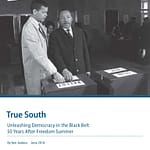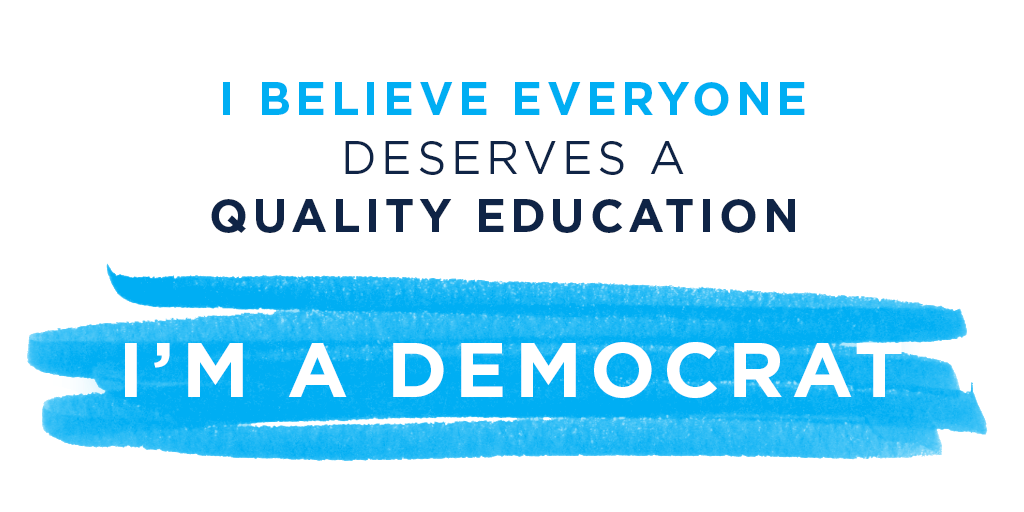
This fall, Virginians will vote on a constitutional amendment that could enshrine political gerrymandering in our state constitution. If you prefer a Virginia where voters choose their politicians with a truly independent and non-partisan redistricting commission, we must vote NO on Amendment 1.
The rationale for Democratic Voters
At first glance, the amendment looks good: it establishes a bipartisan commission to draw redistricting lines. But there is a “Poison Pill” in the full text of the amendment, which is not included in the explanation on the ballot. This “Poison Pill” establishes a redistricting process that makes political gerrymandering legal in Virginia and is much worse than what we have today.
What’s a “Poison Pill”? It’s a little provision in a big law that undermines the overall intent of the law. In this case, the poison pill provides that a mere 2 members of the 16-member commission can veto the State plan, then the Commission is scrapped and the VA Supreme Court takes over to draw the lines. What’s wrong with this?
• The VA Supreme Court is highly partisan. Currently, it has 6 Republicans and 1 Democrat. The Court is appointed by the majority party of the Legislature in Virginia. Thus, the Amendment continues to have the political majority draw the lines. This seems like what we have now, but it is much worse because …
• The Amendment overrules the new Anti-Political-Gerrymandering law passed this year and does nothing to ban political gerrymandering. The Amendment provides no rules or objectives governing the VA Supreme Court’s redistricting. No objective to keep geographical communities together. No objective to represent the political makeup of the voters. Under the Amendment, it will be perfectly legal for the VA Supreme Court to draw redistricting lines with the sole purpose of making both houses of the legislature a Republican majority — no matter how crazy the maps end up looking.
• There is no requirement of fairness, transparency, or justification of the lines drawn. We will never know the rationale behind the lines the Court does not have to justify its decision. The sister of a sitting Republican Senator is on the Court, and she will be empowered to draw the lines of her brother’s district in favor of her brother. This will be completely legal.
• The VA Supreme Court’s map will be unchallengeable because there is no higher court to appeal to. The Amendment overrules the Constitutional system of checks and balances as relates to redistricting.
• And the worst part of all is that this Amendment will likely result in a perpetually Republican legislature and Supreme Court regardless of the changing political demographics of the State. Under the Amendment, the Republican Court can legally draw the lines to favor its own party thereby guaranteeing a Republican majority in the Legislature. The Republic majority in the Legislature, in turn, will continue to appoint Republican justices guaranteeing a Republican majority in the Supreme Court. This would be completely legal under the Amendment.
In essence, the Amendment establishes a system whereby the VA Supreme Court, as it exists in 2021 (6 Republicans and 1 Democrat) will choose the majority party of the Legislature in 2021 and that majority and the Supreme Court’s majority will be locked-in forever.
The amendment is opposed by the Democratic Party of Virginia, the Democratic Black Caucus of Virginia, founding board member, and former president of OneVirginia2021 Linda Perriello, among others.
Vote “NO” to the Constitutional Amendment #1
The rationale for ALL voters – Republican and Democrat
• The Amendment does nothing to ban political gerrymandering. Instead, it overrules the law that was passed this year to ban gerrymandering in redistricting in 2021;
• The Commission is not independent or non-partisan. Its membership is limited to those chosen by just four politicians: the party leaders in each house;
• The Legislature will set the rules for redistricting that the Commission has to follow, so the Legislature remains in control of the process;
• The “citizen” members are chosen by the two political parties, so they will be loyal party members;
• The Legislators on the Commission can veto the work of the citizen members. The Commission is a sham attempting to hide that fact that the power will stay in the Legislature;
• The timeline in the Amendment is untenable, guaranteeing the failure of the Commission and guaranteeing that the Supreme Court, which is chosen by the Legislature, will draw the district lines;
• The Amendment locks in the 2-party system because there is no representation of other political parties or independents;
• This Amendment has too many flaws to enshrine it in our Constitution. A Constitutional Amendment is too important to get wrong.
Answers to some of the questions that may be asked:
What will happen if the Amendment fails?
Last year, the Legislature passed a law that outlaws political and racial gerrymandering for 2021 redistricting. If the Amendment fails, the Legislature would be obligated to draw fair districting lines and their plan would be challengeable in court if it is politically or racially unfair.
I hear that OneVirginia2021 says that Democrats have changed their minds because they want their chance to gerrymander the State in favor of Democrats. The Democrats have always supported an independent commission for redistricting and OneVirginia2021 used to support this same goal. It’s OneVirginia2021 that has changed its mind.
If this is true, how did the Democrats let this Amendment get on the ballot? The Republicans inserted the “Poison Pill” at the last moment, and Legislators had only 20 minutes to review everything before the vote. Many Democrats felt it was a “good start” but now admit they made a bad mistake.


